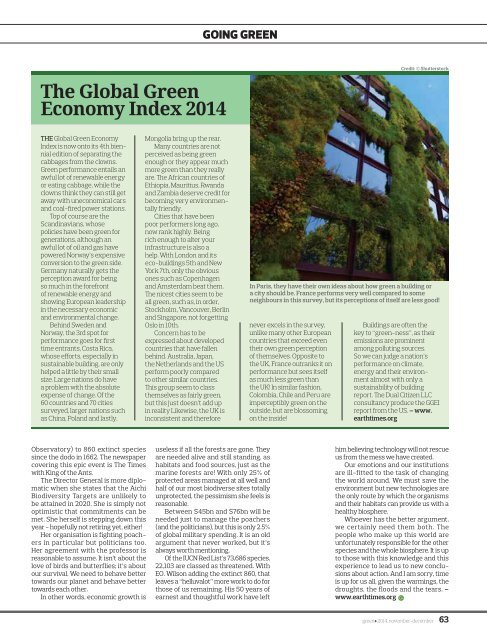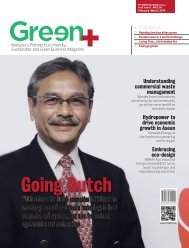Green+ Malaysia's Premier Eco-friendly, Sustainable and Green Business Magazine
SIRIM - Technology Provider
SIRIM - Technology Provider
Create successful ePaper yourself
Turn your PDF publications into a flip-book with our unique Google optimized e-Paper software.
GOING GREEN<br />
The Global <strong>Green</strong><br />
<strong>Eco</strong>nomy Index 2014<br />
Credit: © Shutterstock<br />
The Global <strong>Green</strong> <strong>Eco</strong>nomy<br />
Index is now onto its 4th biennial<br />
edition of separating the<br />
cabbages from the clowns.<br />
<strong>Green</strong> performance entails an<br />
awful lot of renewable energy<br />
or eating cabbage, while the<br />
clowns think they can still get<br />
away with uneconomical cars<br />
<strong>and</strong> coal-fired power stations.<br />
Top of course are the<br />
Sc<strong>and</strong>inavians, whose<br />
policies have been green for<br />
generations, although an<br />
awful lot of oil <strong>and</strong> gas have<br />
powered Norway’s expensive<br />
conversion to the green side.<br />
Germany naturally gets the<br />
perception award for being<br />
so much in the forefront<br />
of renewable energy <strong>and</strong><br />
showing European leadership<br />
in the necessary economic<br />
<strong>and</strong> environmental change.<br />
Behind Sweden <strong>and</strong><br />
Norway, the 3rd spot for<br />
performance goes for first<br />
time entrants, Costa Rica,<br />
whose efforts, especially in<br />
sustainable building, are only<br />
helped a little by their small<br />
size. Large nations do have<br />
a problem with the absolute<br />
expense of change. Of the<br />
60 countries <strong>and</strong> 70 cities<br />
surveyed, larger nations such<br />
as China, Pol<strong>and</strong> <strong>and</strong> lastly,<br />
Mongolia bring up the rear.<br />
Many countries are not<br />
perceived as being green<br />
enough or they appear much<br />
more green than they really<br />
are. The African countries of<br />
Ethiopia, Mauritius, Rw<strong>and</strong>a<br />
<strong>and</strong> Zambia deserve credit for<br />
becoming very environmentally<br />
<strong>friendly</strong>.<br />
Cities that have been<br />
poor performers long ago,<br />
now rank highly. Being<br />
rich enough to alter your<br />
infrastructure is also a<br />
help. With London <strong>and</strong> its<br />
eco-buildings 5th <strong>and</strong> New<br />
York 7th, only the obvious<br />
ones such as Copenhagen<br />
<strong>and</strong> Amsterdam beat them.<br />
The nicest cities seem to be<br />
all green, such as, in order,<br />
Stockholm, Vancouver, Berlin<br />
<strong>and</strong> Singapore, not forgetting<br />
Oslo in 10th.<br />
Concern has to be<br />
expressed about developed<br />
countries that have fallen<br />
behind. Australia, Japan,<br />
the Netherl<strong>and</strong>s <strong>and</strong> the US<br />
perform poorly compared<br />
to other similar countries.<br />
This group seem to class<br />
themselves as fairly green,<br />
but this just doesn’t add up<br />
in reality Likewise, the UK is<br />
inconsistent <strong>and</strong> therefore<br />
In Paris, they have their own ideas about how green a building or<br />
a city should be. France performs very well compared to some<br />
neighbours in this survey, but its perceptions of itself are less good!<br />
never excels in the survey,<br />
unlike many other European<br />
countries that exceed even<br />
their own green perception<br />
of themselves. Opposite to<br />
the UK, France outranks it on<br />
performance but sees itself<br />
as much less green than<br />
the UK! In similar fashion,<br />
Colombia, Chile <strong>and</strong> Peru are<br />
imperceptibly green on the<br />
outside, but are blossoming<br />
on the inside!<br />
Buildings are often the<br />
key to “green-ness”, as their<br />
emissions are prominent<br />
among polluting sources.<br />
So we can judge a nation’s<br />
performance on climate,<br />
energy <strong>and</strong> their environment<br />
almost with only a<br />
sustainability of building<br />
report. The Dual Citizen LLC<br />
consultancy produce the GGEI<br />
report from the US. – www.<br />
earthtimes.org<br />
Observatory) to 860 extinct species<br />
since the dodo in 1662. The newspaper<br />
covering this epic event is The Times<br />
with King of the Ants.<br />
The Director General is more diplomatic<br />
when she states that the Aichi<br />
Biodiversity Targets are unlikely to<br />
be attained in 2020. She is simply not<br />
optimistic that commitments can be<br />
met. She herself is stepping down this<br />
year - hopefully not retiring yet, either!<br />
Her organisation is fighting poachers<br />
in particular but politicians too.<br />
Her agreement with the professor is<br />
reasonable to assume. It isn’t about the<br />
love of birds <strong>and</strong> butterflies; it’s about<br />
our survival. We need to behave better<br />
towards our planet <strong>and</strong> behave better<br />
towards each other.<br />
In other words, economic growth is<br />
useless if all the forests are gone. They<br />
are needed alive <strong>and</strong> still st<strong>and</strong>ing, as<br />
habitats <strong>and</strong> food sources, just as the<br />
marine forests are! With only 25% of<br />
protected areas managed at all well <strong>and</strong><br />
half of our most biodiverse sites totally<br />
unprotected, the pessimism she feels is<br />
reasonable.<br />
Between $45bn <strong>and</strong> $76bn will be<br />
needed just to manage the poachers<br />
(<strong>and</strong> the politicians), but this is only 2.5%<br />
of global military spending. It is an old<br />
argument that never worked, but it’s<br />
always worth mentioning.<br />
Of the IUCN Red List’s 73,686 species,<br />
22,103 are classed as threatened. With<br />
EO. Wilson adding the extinct 860, that<br />
leaves a “helluvalot” more work to do for<br />
those of us remaining. His 50 years of<br />
earnest <strong>and</strong> thoughtful work have left<br />
him believing technology will not rescue<br />
us from the mess we have created.<br />
Our emotions <strong>and</strong> our institutions<br />
are ill-fitted to the task of changing<br />
the world around. We must save the<br />
environment but new technologies are<br />
the only route by which the organisms<br />
<strong>and</strong> their habitats can provide us with a<br />
healthy biosphere.<br />
Whoever has the better argument,<br />
we certainly need them both. The<br />
people who make up this world are<br />
unfortunately responsible for the other<br />
species <strong>and</strong> the whole biosphere. It is up<br />
to those with this knowledge <strong>and</strong> this<br />
experience to lead us to new conclusions<br />
about action. And I am sorry, time<br />
is up for us all, given the warmings, the<br />
droughts, the floods <strong>and</strong> the tears. –<br />
www.earthtimes.org<br />
green+.2014, november-december 63





